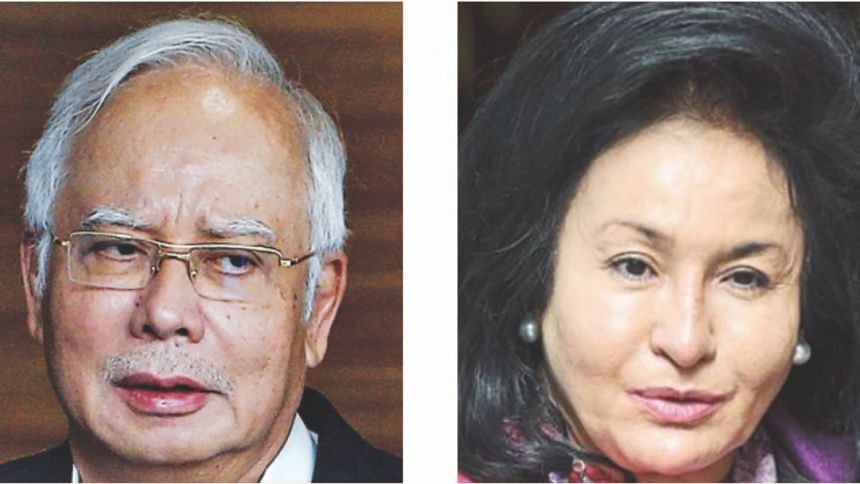Najib: from powerful PM to graft suspect

From prime minister of Malaysia two months ago to key suspect in a massive corruption scandal, Najib Razak's stunning fall from grace has been swift and hard.
Since his shock election defeat in May, Najib has faced a tightening noose as the new government headed by his former mentor Mahathir Mohamad ramped up investigations into allegations of graft and excess that have hung over him and his wife Rosmah Mansor for years.
The bland patrician son of one of Malaysia's founding fathers, Najib, 64, had been groomed for the prime minister's post from young.
When he took over in 2009, Najib initially presented himself as a reformer.
He made limited changes such as replacing security laws widely criticised as stifling dissent, offering a glimmer of hope for the end to repressive tactics by the once-invincible coalition that had held power for six decades.
But the UK-educated Najib was seen by many as an aloof elitist with little understanding of Malaysia's common citizenry, a perception accentuated by frequent tone-deaf gaffes and policies such as the 2015 introduction of a sales tax unpopular with the poor and now set to be eliminated.
Rosmah, meanwhile, was a constant lightning rod for critics due to her imperious manner and elaborately coiffed mane of hair, which she once complained cost her 1,200 ringgit ($300) per house-call from stylists. Malaysia's minimum monthly wage at the time was 900 ringgit.
That and similar episodes caused her to be reviled in a multi-cultural country where most of the population are modest-living Muslims.
'Cash is king'
New Prime Minister Mahathir has said Najib told him in a private conversation in 2015 that "cash is king" in maintaining political support in Malaysia, a phrase that opponents have turned against Najib as a sign of his hubris and corruption.
Money and power seemed to work as a firewall against Najib through a scandal involving Malaysia's 2002 purchase of French submarines while he was defence minister, a deal brokered by a close associate of his.
Allegations later emerged of huge kickbacks to Malaysian officials to secure the deal, and the scandal was punctuated by the murder of a Mongolian woman, Altantuya Shaariibuu, who was involved in the negotiations.
Her body was blown up near Kuala Lumpur using military-grade explosives.
Two officers in a special unit that guarded Malaysian ministers were convicted of the killing, but suspicion that Najib and Rosmah were involved has hovered for years, with Najib at one point being forced to deny he had an affair with the 28-year-old Altantuya.
But the final straw was 1MDB, (1Malaysia Development Berhad), a fund Najib launched to promote economic development.
Soon after Najib won a second term in 2013, 1MDB slid into a massive debt hole and allegations surfaced that money was missing.
Public disgust with reports that began to emerge four years ago detailing the plundering of the sovereign wealth fund snowballed into the Mahathir-led electoral tsunami that now has Najib in police cross-hairs.
Billions of dollars are said to be missing in the scandal, nearly $700 million of which was deposited into Najib's bank account alone.
A 2015 investigative report by the New York Times also alleged that millions of dollars were used to purchase jewellery for Rosmah.
In a speech last year, US Attorney General Jeff Sessions criticised those allegedly involved in the scandal, adding: "This is kleptocracy at its worst."
Najib steadfastly denied wrongdoing, while persecuting his accusers and shutting down media outlets that reported on the affair.

 For all latest news, follow The Daily Star's Google News channel.
For all latest news, follow The Daily Star's Google News channel. 



Comments